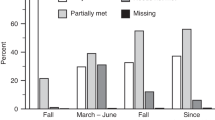Abstract
The COVID-19 pandemic will leave an indelible mark on the careers of current medical trainees. Given the disruptions to medical education, economic impact on institutions, and the uncertainties around future job prospects, trainees are facing unprecedented challenges. This situation is especially concerning for futures of pediatric physician-scientist trainees, where concerns regarding maintaining the pipeline were well documented prior to the emergence of COVID-19. In this Perspectives article, we leverage the unique expertise of our workgroup to address concerns of physician-scientist trainees and to provide suggestions on how to navigate career trajectories in the post-COVID-19 era. We identified and addressed four major areas of concern: lack of in-person conferences and the associated decrease access to mentors and networking activities, decreased academic productivity, diminished job prospects, and mental health challenges. We also suggest actions for trainees, mentors and educational leaders, and institutions to help support trainees during the pandemic, with a goal of maintaining the pediatric physician-scientist pipeline.
Impact
-
The advice in this article will provide guidance to pediatric physician-scientist trainees on sustaining and developing their career during the continued challenges presented by COVID-19.
-
We also provide suggestions for mentors, educational leaders, institutions, and professional societies on ways to help support the pediatric physician-scientist pipeline.
Similar content being viewed by others
Log in or create a free account to read this content
Gain free access to this article, as well as selected content from this journal and more on nature.com
or
References
Shah, J. P. The impact of COVID-19 on head and neck surgery, education, and training. Head Neck. 42, 1344–1347 (2020).
Escalon, M. X., Raum, G., Tieppo Francio, V., Eubanks, J. E. & Verduzco-Gutierrez, M. The immediate impact of the coronavirus pandemic and resulting adaptations in physical medicine and rehabilitation medical education and practice. PM R 12, 1015–1023 (2020).
Cutler, D. How will COVID-19 affect the health care economy? JAMA 323, 2237–2238 (2020).
Cornfield, D. N., Lane, R. & Abman, S. H. Creation and retention of the next generation of physician-scientists for child health research. JAMA 309, 1781–1782 (2013).
Burns, A. M. et al. Fixing the leaky pipeline: identifying solutions for improving pediatrician-scientist training during pediatric residency. Pediatr. Res. 88, 163–167 (2020).
Shurin, S. B. The American Pediatric Society commentary: The future of pediatric physician scientists is in our hands. Arch. Pediatr. Adolesc. Med. 166, 503–505 (2012).
Rosenblum, N. D., Kluijtmans, M. & Ten Cate, O. Professional identity formation and the clinician–scientist: a paradigm for a clinical career combining two distinct disciplines. Acad. Med. 91, 1612–1617 (2016).
Burns, A. M. et al. Strengthening the pipeline for clinician-scientists: the pediatrician-scientist training and development program at Texas Children’s Hospital. J. Pediatr. 172, 5–6.e5 (2016).
Viglione, G. How scientific conferences will survive the coronavirus shock. Nature 582, 166–167 (2020).
NeoHeart 2020: cardiovascular management of the neonate. https://web.cvent.com/event/2fb59f4f-ac0e-4074-b856-99656d06ab65/summary (2020).
O’Glasser, A. Y., Jaffe, R. C. & Brooks, M. To tweet or not to tweet, that is the question. Semin. Nephrol. 40, 249–263 (2020).
Mikolajczyk, A. E. et al. #LiverTwitter: an emerging tool for liver education and research. Hepatol. Commun. 4, 1229–1233 (2020).
Breu, A. C. From tweetstorm to tweetorials: threaded tweets as a tool for medical education and knowledge dissemination. Semin. Nephrol. 40, 273–278 (2020).
Breu, A. C. Why is a cow? Curiosity, tweetorials, and the return to why. N. Engl. J. Med. 381, 1097–1098 (2019).
Tuttle, K. R. Impact of the COVID-19 pandemic on clinical research. Nat. Rev. Nephrol. 16, 562–564 (2020).
Andriole, D. A., Whelan, A. J. & Jeffe, D. B. Characteristics and career intentions of the emerging MD/PhD workforce. JAMA 300, 1165–1173 (2008).
Cardel, M. I., Dean, N. & Montoya-Williams, D. Preventing a secondary epidemic of lost early career scientists: effects of COVID-19 pandemic on women with children. Ann. Am. Thorac. Soc. 17, 1366–1370 (2020).
Gabster, B. P., van Daalen, K., Dhatt, R. & Barry, M. Challenges for the female academic during the COVID-19 pandemic. Lancet 395, 1968–1970 (2020).
Borges, N. J., Navarro, A. M., Grover, A. & Hoban, J. D. How, when, and why do physicians choose careers in academic medicine? A literature review. Acad. Med. 85, 680–686 (2010).
Termini, C. M. & Traver, D. Impact of COVID-19 on early career scientists: an optimistic guide for the future. BMC Biol. 18, 95 (2020).
Robbins, S. L. et al. The impact of the COVID-19 shutdown on US pediatric ophthalmologists. J. AAPOS 24, 189–194 (2020).
Lai, J. et al. Factors associated with mental health outcomes among health care workers exposed to coronavirus disease 2019. JAMA Netw. Open 3, e203976 (2020).
Ahmad, A. Why you should ignore all that coronavirus-inspired productivity pressure. https://www.chronicle.com/article/why-you-should-ignore-all-that-coronavirus-inspired-productivity-pressure/ (2020).
Author information
Authors and Affiliations
Consortia
Contributions
All authors made substantial contributions to the conception and design of the article, made critical revisions for important intellectual content, and approved the version to be published. In addition to the above, C.S.F., S.T.N., and W.T.P. co-wrote the first draft of the manuscript.
Corresponding author
Ethics declarations
Competing interests
The authors declare no competing interests.
Additional information
Publisher’s note Springer Nature remains neutral with regard to jurisdictional claims in published maps and institutional affiliations.
Supplementary information
Rights and permissions
About this article
Cite this article
Forster, C.S., Nguyen, S.T., Powell, W.T. et al. Perspectives from the Society for Pediatric Research: advice on sustaining science and mentoring during COVID-19. Pediatr Res 90, 738–743 (2021). https://doi.org/10.1038/s41390-020-01321-5
Received:
Accepted:
Published:
Version of record:
Issue date:
DOI: https://doi.org/10.1038/s41390-020-01321-5
This article is cited by
-
Quick to connect: a comparison of virtual and in-person speed mentoring for emergency medicine medical students, residents by faculty at a national conference
International Journal of Emergency Medicine (2025)
-
NIH-funded neonatologist physician-scientists: an exploration of equity and success
Pediatric Research (2025)
-
Impact of early COVID-19-related challenges on pediatric researchers: an exploratory analysis
Pediatric Research (2023)
-
The state and future of pediatric research—an introductory overview
Pediatric Research (2023)
-
Adapting Mentoring in Times of Crisis: What We Learned from COVID-19
Academic Psychiatry (2022)


